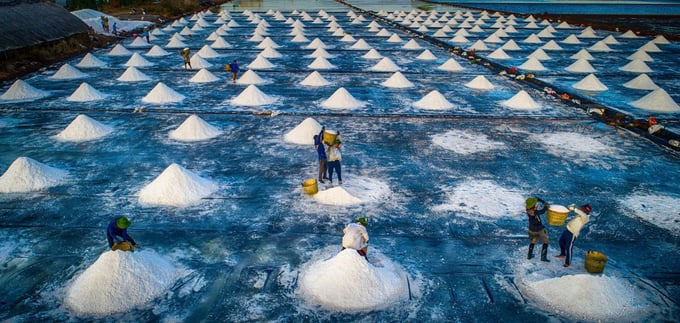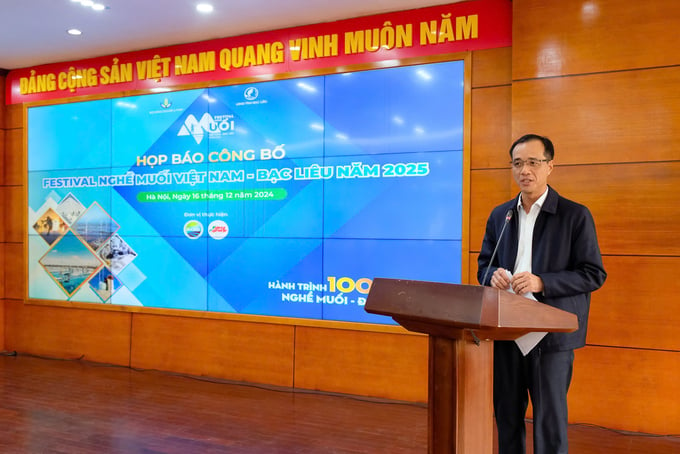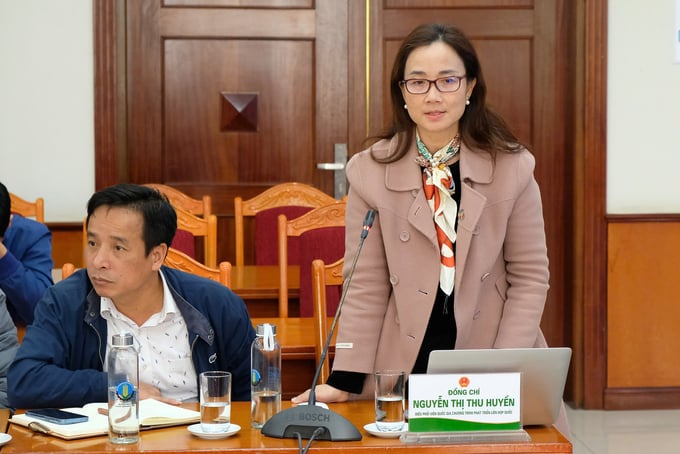May 24, 2025 | 16:20 GMT +7
May 24, 2025 | 16:20 GMT +7
Hotline: 0913.378.918
May 24, 2025 | 16:20 GMT +7
Hotline: 0913.378.918

Bac Lieu is proud to be one of the localities with a long-standing tradition of salt making, preserved for hundreds of years.
The Vietnam Salt Industry Festival – Bac Lieu 2025 is a significant milestone in the development of Bac Lieu's traditional salt-making process. As announced during the press conference this week, this event not only honors the contributions of salt producers but also offers an opportunity to showcase the value of Bac Lieu's salt to both domestic and international audiences.
With a production history that covers hundreds of years, Bac Lieu is one of the provinces that is most closely associated with traditional salt-craft. The Ministry of Culture, Sports, and Tourism has designated the salt production craft as a National Intangible Cultural Heritage. Presently, the province comprises 700 households and produces salt on an estimated 1,400 hectares. Despite numerous challenges, salt farmers have persisted in preserving their craft.
The Vietnam Salt Festival – Bac Lieu 2025: A Hundred-Year Journey of Salt Craft - A Lifetime is anticipated to take place from March 6-8, 2025, according to Ngo Nguyen Phong, Deputy Director of the Bac Lieu Department of Agriculture and Rural Development.

Deputy Director of the Department of Agriculture and Rural Development of Bac Lieu province Ngo Nguyen Phong spoke at the press conference on the morning of December 16. Photo: Tung Dinh.
The event will include crucial activities such as a press conference, an inauguration ceremony, and exhibition spaces that will exhibit salt products, physical models, and scientific advancements in salt processing. Furthermore, conferences and seminars, including the Bac Lieu Investment Promotion Conference, the Trade Promotion Conference, and a mid-term review of Government Decree 40 on salt production management, will be conducted. The event will also feature workshops on the science and technology of salt production in the context of climate change. Side events will encompass local culinary exhibits, cultural performances, and tourism experiences.
Bac Lieu's objective is to leave a positive impression on both locals and visitors by participating in the Vietnam Salt Festival – Bac Lieu 2025: 100-Year Journey of Salt – A Lifetime. This event will also contribute to the province's economic, cultural, and social development, while also elevating the value of Vietnamese salt in general and Bac Lieu salt more specifically.
The Bac Lieu Department of Agriculture and Rural Development recognizes the significance of the salt-making craft and has implemented a variety of support measures to assist salt farmers, including salt-processing equipment, capacity-building training, and the establishment of over ten salt-production cooperatives. These cooperatives are building interconnected production channels, expanding markets, and improving the value of their products.
Additionally, enterprises from South Korea and Singapore have invested in salt storage facilities, processing factories, and product display areas in Bac Lieu. The province has proposed the construction of large storage facilities to preserve salt for long periods and enhance its economic value, as the 2023 salt output exceeds 70,000 tons. This is particularly noteworthy.

Ms. Nguyen Thi Thu Huyen, coordinator of the United Nations Development Program (UNDP) in Vietnam, hopes that the first Salt Festival will vividly demonstrate and promote the diverse values of the salt industry. Photo: Tung Dinh.
The current price of salt in Bac Lieu is low, at approximately 1,000 VND per kilogram, which presents a challenge in attracting investment, despite the potential for long-term development. Consequently, the province aspires to attract the attention of a variety of organizations, businesses, and international investors through this festival to encourage the advancement of salt refining and exports.
Mr. Ngo Nguyen Phong emphasized that the festival will serve as a bridge to increase the value of Bac Lieu salt, thereby introducing the product to international markets and fostering the province's economic, cultural, and social growth.
Bac Lieu also intends to integrate digital technology into the salt industry, with a focus on assuring product quality and hygiene, as well as production management and transparency of information. This will not only enhance economic efficiency but also firmly establish Bac Lieu salt's position in the global value chain.
A representative of the United Nations Development Programme (UNDP) in Vietnam proposed solutions at the press conference to support cultural experiences in Bac Lieu and sustain and develop traditional salt production. The objective is to guarantee that salt producers are not neglected, thereby enabling them to maintain their dedication and sense of esteem in this ancient craft.
"Salt craft is not only economically valuable but also culturally and socially significant, as salt is a part of history." Nguyen Thi Thu Huyen, UNDP coordinator, stated that the premiere Salt Festival will "vividly emphasize and promote the diverse values of the salt-making craft."
In 2022, when UNDP received a project from Bac Lieu to assist salt producers with tarpaulin-covered salt production, significant worries erupted regarding pollution in brackish water shrimp farming areas. Salt farmers frequently lack the financial resources to raise shrimps in coastal ecosystems and are unable to establish alternative livelihoods beyond salt production. UNDP expressed concerns about the environmental consequences of tarpaulin-covered salt-making and underscored the necessity of diversifying the value from salt fields.
To resolve environmental concerns, the United Nations Development Programme (UNDP) implemented the cultivation of saltwort in Bac Lieu. This plant is abundant in potassium and omega-3 fats, which provide considerable added value. UNDP underscored the significance of sustainable production, which minimizes plastic pollution in salt fields, enhances water management, and prevents environmental damage.
Translated by Linh Linh

(VAN) The mutual export of agrifood products between the European Union (EU) and the United Kingdom (UK) must occur again without certification, border controls or other red tape. This was agreed at the UK-EU summit.
/2025/05/22/5121-2-173645_677.jpg)
(VAN) NBSAP Tracker identifies strengths and areas for improvement in the National Biodiversity Strategy, based on each region’s priorities and capacities.

(VAN) The draft amendment to the Circular on rice export trading stipulates a periodic reporting regime for rice exporting enterprises.

(VAN) Dong Thap farmers attained an average profit margin of 64% during the summer-autumn 2024 crop (first season), while An Giang and Kien Giang farmers followed with 56% and 54%, respectively.

(VAN) As a doctoral student doing research on renewable energy and electrification at Harvard University, the author shares his musings on electricity, nature, and countryside memories.

(VAN) The decree on Extended Producer Responsibility (EPR) ensures transparent management and disbursement of support funds, avoiding the creation of a “give-and-take” mechanism.

(VAN) Hue City rigorously enforces regulations regarding marine fishing and resource exploitation, with a particular emphasis on the monitoring of fishing vessels to prevent illegal, unreported, and unregulated (IUU) fishing.